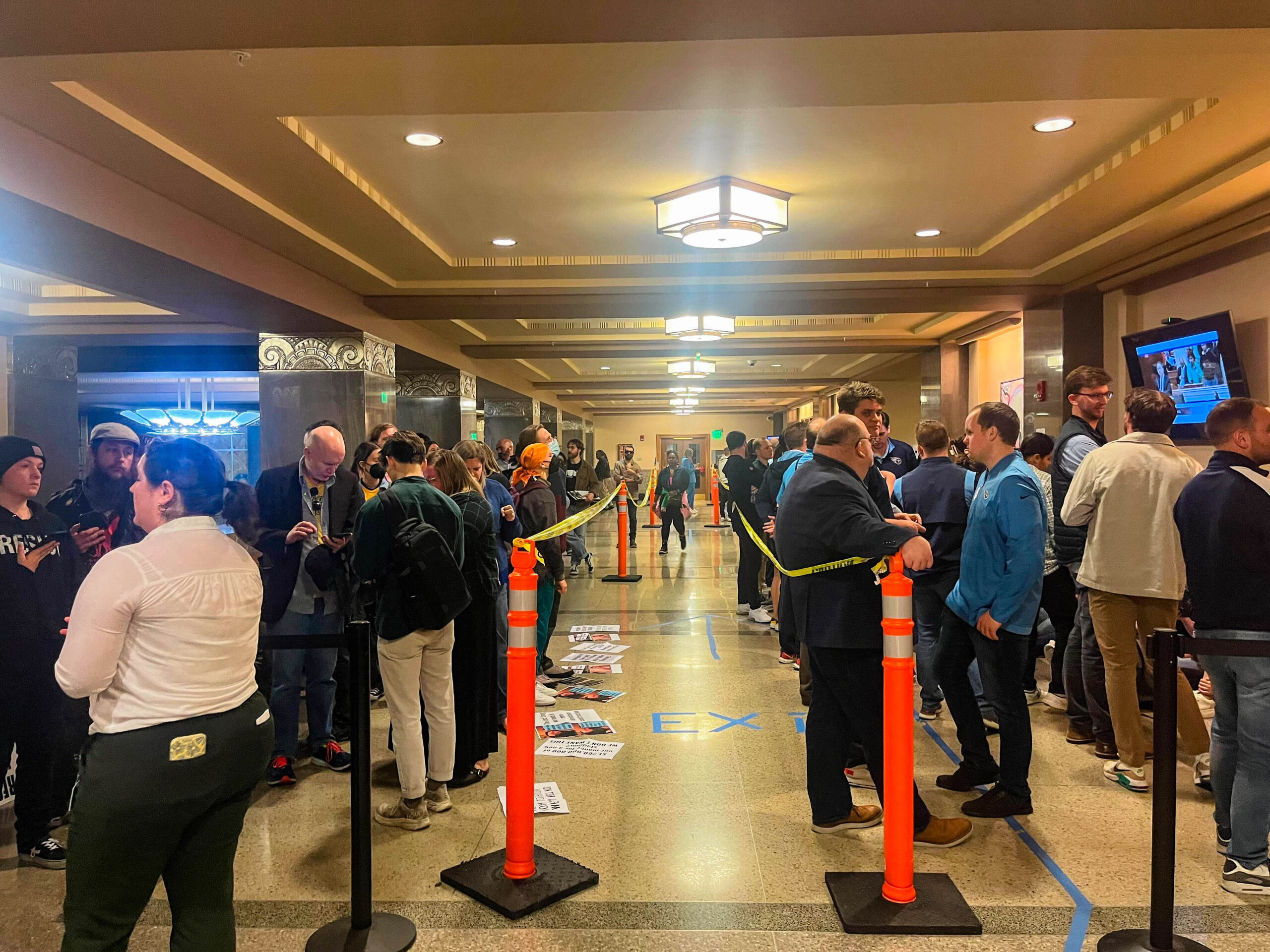
As 2023 nears its end, WPLN is looking back at some of its biggest stories of the last year. And, for Nashville’s city government, there is no shortage of pivotal moments — many of which will ripple into the new year, with the new administration.
Titans stadium deal
 Cynthia Abrams WPLN News
Cynthia Abrams WPLN NewsSupporters and opponents of a new Titans stadium deal line opposite sides of the Metro Courthouse.
Early this year, much of the city’s focus was on the new Titans stadium. In April, the city council approved the $2.1 billion deal, setting the massive project in motion.
But, it wasn’t all smooth sailing. Former Mayor John Cooper, state legislators and the team negotiated the deal for at least a year. By the time it hit the Metro Council for its final approval in April, it had garnered a number of naysayers, both in the community and on the council.
Following a seven-hour public hearing — the majority of which was dominated by opponents — the plan passed, making the deal the largest sports subsidy in U.S. history.
With the city contributing a cool $760 million — and the state throwing in another half a billion — it surpassed other subsidies by nearly 50%. It’s also one of the rare times this year that the state and the city were in agreement.
City-state relations
Otherwise, city-state tensions reached an all-time high, consuming much of Metro’s attention. The state spent a significant portion of their legislative session passing a slew of preemption bills that undermined Nashville’s right to self-governance.
 Cynthia Abrams WPLN News
Cynthia Abrams WPLN NewsMetro Law Director Wally Dietz speaks following a three-judge panel’s decision to issue a temporary injunction against the Metro Council Reduction Act.
Residents and council members viewed the targeted legislation as a form of political retaliation, stemming from the council’s rejection of a proposal that would have seen Nashville host the 2024 Republican National Convention.
The legislature passed the Metro Council Reduction Act, a bill that would have slashed the city council in half. Both the Airport Authority and the Sports Authority boards were overhauled, allowing the governor the right to appoint a handful of the seats on each board. Previously, all members were appointed by the mayor.
The state passed legislation abolishing civilian-led police oversight boards, eliminating Memphis and Nashville’s Community Oversight Boards. They also prevented the city from implementing stricter energy codes and attempted to defund Nashville’s convention center.
The council worked for the remainder of the state’s legislative session to undo state action. When Rep. Justin Jones was expelled from the statehouse, the council voted to reinstate him to his seat. Metro Legal sued the state over the council reduction bill and the Airport and Sports Authority boards.
“If we don’t put safeguards in to protect ourselves in the way that we have the power to do, we are going to find ourselves having nothing and being even more victimized by the state,” Councilmember Ginny Welsch said.
Some of the litigation is still ongoing. But, now that will fall to new leadership.
New administration
 Cynthia Abrams WPLN News
Cynthia Abrams WPLN NewsFreddie O’Connell grins on stage during his Election Night party on Sept. 14.
In the summer, Nashville elected a new mayor, vice mayor and council.
Former Councilmember Freddie O’Connell won a decisive victory against conservative opponent, Alice Rolli. Former Councilmember Angie Henderson defeated the incumbent, Jim Shulman, in the race for vice mayor, and a host of new faces were elected to the Metro Council. For the first time in history, the council is majority female, and all five at-large seats are women.
Though the new leadership is only a few months into their four-year term, they’ve already broken with patterns of the past. The council has, so far, shown some resistance to police funding, raising questions about what a more progressive council will mean for the city.
For now, questions remain: How will the East Bank — the area around the new stadium — be developed? What’s next for the fairgrounds racetrack? Will the mayor ask voters to pass a transit funding referendum?
In 2024, major decisions are on the horizon.

